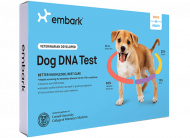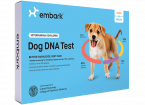How accurate are pet DNA tests?
Tests are highly accurate, with some companies advertising up to 99% accuracy. Factors like sample quality can impact accuracy. Make sure to follow the test instructions to ensure the best possible results. Since tests rely on collecting a saliva sample on a cotton swab, collecting enough saliva is the most important thing you can do to ensure accuracy.
How much does a pet DNA test cost?
Costs vary between tests but most fall within the $100 – $150 range. Make sure to read what the test does before deciding which to purchase. Some tests give you more information than others – these will usually cost more.
What is the best pet DNA test?
When deciding which DNA test to buy, look at how much information you get for the price. That’s why we recommend Embark or Wisdom Panel for dogs and Basepaws for cats. Each of these tests gives you a lot of genetic information for your furry friend, including their breed and ancestry. Basepaws tests even come with a free veterinary consultation.
Where can I buy a pet DNA test?
Right here on DNAWeekly! We even have a bunch of coupons for you on this page.
Do vets do DNA tests?
They do, but we recommend doing a DNA test at home. It’s more convenient since you can do the test on your own time. Testing at home is also more comfortable for your pet. Doing the test at home lets you avoid an unnecessary, stressful veterinary appointment.
Can DNA tests tell a dog’s breed?
Yes! Tests like Embark will compare your dog’s genetic makeup to hundreds of breeds. The test can tell you the family history of your dog and give you exact breed percentages, even if your dog is a mixed breed. Embark will even find your dog’s living relatives and facilitate a meetup!
Who should get a pet DNA test?
DNA tests are perfect for anybody interested in learning more about their pet! You don’t need to be a breeder or professional dog trainer. It’s fun and insightful to learn about your pet’s family background, where their looks come from, and get some insight into their unique personality quirks.
What can you learn from a pet DNA test?
Testing your dog can tell you exact breed percentages. Breed information can give you insight into their behavior, what food they’ll like, and their ideal housing situation. Embark even gives you a family tree showing the different generations that mixed together to create your unique furry friend. Basepaws and other cat tests will show you their breed families and their wildcat ancestors.
What can’t you learn from a pet DNA test?
While a DNA test is helpful in making decisions for your pet, they only offer warnings of potential health risks. Remember, animals are complex creatures. Just because your pet’s ancestry implies certain characteristics, be careful not to view that as an absolute guide to its behavior. Genetic makeup is important, but it’s only one of many factors that influences their behavior and health.
What other types of DNA test kits are available?
Plenty for humans! Ancestry DNA tests – like MyHeritage or AncestryDNA – are very popular. These tests give you a complete ancestry breakdown and family tree. DNA tests are also useful for detecting potential health problems and guiding diet, nutritional, or fitness decisions. Doctors also use DNA testing to guide medical decisions.









